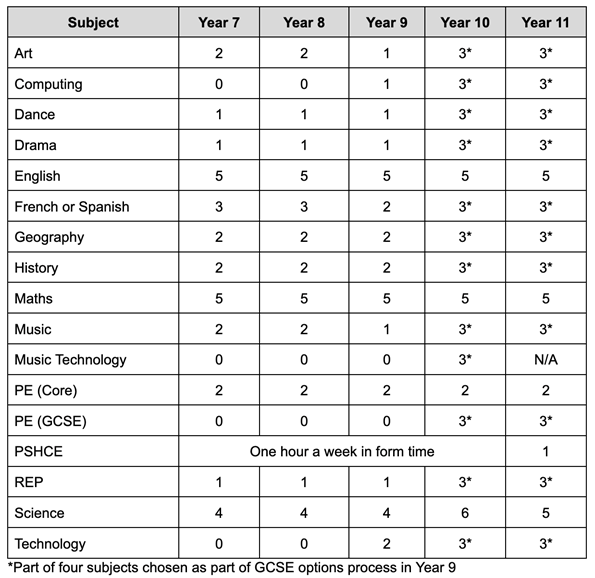Our Curriculum Purpose
Our shared intent at Trinity Academy is to provide a curriculum that is highly academic and ambitious for all students, regardless of prior attainment, and that particularly prizes the performing arts and is reflective of our local community.
Each subject curriculum is planned by subject specialists with a strong understanding of the types of knowledge present in their subject. This knowledge can be the facts that students need to know, the procedures students need to learn or even how knowledge itself is created within a subject by specialists.
Why this Curriculum for our Students?
We are proud to serve a very diverse student community. Typically, students in Year 7 join us from over thirty different local primary schools and, as a result, experience different curricula and varying degrees of academic success. Almost half of our students live in areas of significant socioeconomic deprivation, whilst about a fifth live in areas of very high affluence. Finally, our student community is culturally and ethnically diverse, with around half of Trinity students coming from non-white backgrounds.
The school curriculum is designed with our diverse community in mind. We know students from such a range of primary schools are likely to join us with very different mental maps (or schema) of the world around them, because each primary school curriculum varies in scope and emphasis. To address this, all Year 7 and 8 students (Phase One) learn a common core academic curriculum consisting of facilitative subjects that provide a profound understanding of the world around them – art, English, humanities (history, geography and religion, ethics and philosophy), language (French or Spanish), maths, the performing arts (dance, drama, music), physical education and science. From Year 9, the curriculum expands to include more technical subjects – for example, design & technology, food technology and computing.
We also know that by the time students arrive at secondary school, those from disadvantaged backgrounds tend to have a more limited vocabulary, lower reading ages and fewer cultural experiences. We believe an academic curriculum – with an emphasis on the performing arts – is an effective way to counter this. Subject leaders select carefully the knowledge within their disciplines that profoundly explain the world around us (sometimes referred to as Powerful Knowledge), explicitly teach subject vocabulary and provide plenty of opportunities to read. Our emphasis on the performing arts and on co-curricular clubs also provides a wealth of cultural experiences that students may not have access to outside of school.
Finally, we are proud to serve a culturally diverse community and we want our curriculum to reflect and celebrate the rich diversity in culture of our local community. This, to a varying degree by subject, is reflected in the choice and sequence of knowledge in the curriculum. Parents have the right to withdraw their child from RE lessons.
How the Curriculum is Developed
Individual subject curricula are developed with the school's curriculum purpose in mind and our Trust's curriculum principles in mind. Curriculum leaders develop and refine their subject curriculum through a series of sequential steps, shown below.
- A clear purpose: Curriculum leaders design a curriculum with a purpose in mind that contributes towards the school’s broader curriculum purpose. Knowledge is selected carefully to allow students to develop a deeper understanding of the world around them.
- Knowledge as end points: Curriculum leaders specify knowledge as specific and granular end points. Teachers know the end points for every unit and lesson they teach.
- Sequencing of end points: Each subject curriculum is carefully sequenced so that students develop increasingly rich and complex knowledge. End points are ordered in a way that gives students the best opportunity to learn new things.
- Guided by cognitive science: Each subject curriculum is designed to help students remember what they are taught. This means that new material is taught and then revisited at later points in the curriculum. It also means that the volume of new material taught in any given lesson takes into account the limits of working memory.
- Assessing end points: Assessment is simply a tool to assess students’ understanding of end points and is subservient to the curriculum. We use formative techniques to check for understanding in every lesson and provide precise and immediate feedback. Summative assessment checks learning over a long period of time.
Equality of Curriculum Access
Our curriculum is developed with all of our students in mind and we are committed to equality of curriculum access, regardless of child's socioeconomic background, prior academic attainment or SEND status. To learn more about how we plan and deliver lessons in a way that support students with SEND, click here.
GCSE Information Videos
Every student in Year 10 and 11 will study a core set of subjects that will prepare them for either five or six GCSE qualifications – English language, English literature, maths and science (worth either two or three GCSEs). Students will then be able to choose four subjects from a range of fourteen choices (one has to be either Geography or History). To find out more about the GCSEs that are available and details of each course, click on the link below.
Number of Lessons Taught Per Subject, Per Week
The table below shows the number of 50-minute periods each subject is taught across the week.

School Contact
If you would like to find out more about the school curriculum, please contact our Deputy Headteacher Mr Joel Brisk using the email address jbrisk@trinityacademybristol.org.
